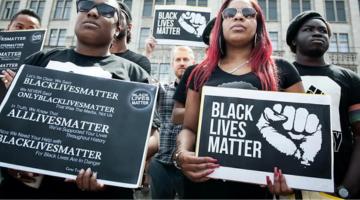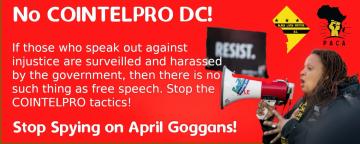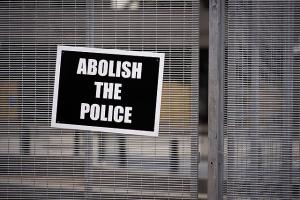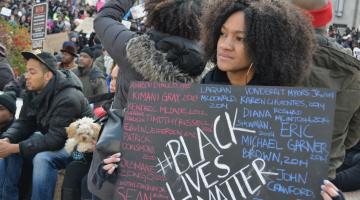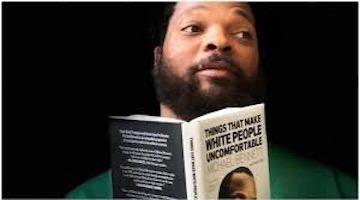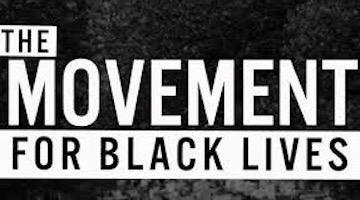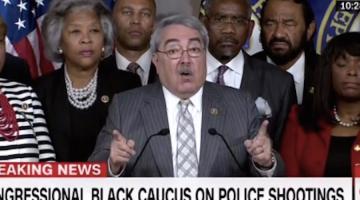When Black Lives Matter chapters demand “abolition” and “defunding” of the police, rather than community control of the cops, they play into the hands of charlatans and misleaders on city councils and in the halls of Congress.
“The proposed charter amendment was at best a symbolic gesture and at worst lessened police accountability for past and future crimes.”
At the height of the Minneapolis rebellion a majority of the city council announced they would move towards “disbanding” their police force, in response to Black Lives Matter “abolition” demands. It turned out that what the councilpersons were actually proposing was a name change, retaining a force of armed cops in a new “Department of Community Safety and Violence Prevention” with a “holistic, public health-oriented” mission. But even this palliative was too much for the Minneapolis Charter Commission, which voted to delay putting the police reorganization question on the November ballot, effectively killing the measure. The city is currently required to maintain a set ratio in the number of cops per resident.
The Twin Cities Coalition for Justice for Jamar (TCC4J), which was formed in the wake of the police killing of Jamar Clark in 2015, never bought into the city council’s name-change game. “The proposed charter amendment was at best a symbolic gesture and at worst lessened police accountability for past and future crimes,” the TCC4J’s Jae Yates told a press conference. “In opposition to the charter amendment, TCC4J instead demands community control of police [CPAC], which will meaningfully curtail the as of yet unchecked power of the MPD to terrorize Black, brown and low income communities. The CPAC legislation puts all oversight of police misconduct back into the hands of the communities that are being policed and provides continuous engagement for community members to address grievances. CPAC consists of a directly-elected all-civilian council, and has final authority over discipline, up to and including subpoena power and the convening of grand juries. In short, the CPAC legislation has all of the details that the city council’s proposal lacked.”
“Community control of police will meaningfully curtail the as of yet unchecked power of the MPD.”
The Minneapolis coalition was among the 800 activists that gathered in Chicago last year to organize a nationwide campaign for community control of the police, under the umbrella of a relaunched National Alliance Against Racist and Political Repression. Nineteen of Chicago’s 50-member board of aldermen have endorsed legislation to create a Civilian Police Accountability Commission (CPAC). “Nothing short of CPAC is what we need and demand,” said Minneapolis organizer Daphne Brown at last week’s press conference. “We don’t want no Community Safety and Violence Prevention Department! Council members, mayor and government in city hall, we don’t want that piece of shit y’all trying to give us. We do not want it. We want what we demand, which is CPAC. That’s the only thing that’s gonna give us the power back to protect our community, protect our families and protect ourselves.”
Brown has been organizing against killer cops since 2013. She doesn’t hesitate to name the Black misleaders that are in on the con. "To the council members that came up with this, you went behind our backs! Andrea Jenkins, Jeremiah Ellison, y’all know that’s not gonna help us.” Brown continued, “We still got killer cops out here y'all. How can we accept anything from these people, knowing we still got killer cops on our streets?
Jamal Clark’s sister, Danielle Burns, sees through the “good Council-bad Commission” con game that’s being played to keep the blue army of occupation on the streets of Minneapolis. “it’s these same folks putting forward a fake fix with their city charter amendment. Changing the police department’s name, that’s not justice,” she said.
“We don’t want no Community Safety and Violence Prevention Department!”
The same hustle-and-jive plays out across the nation, as mainly Democratic city officials attempt to reconcile protesters’ demands with their obligations to the Lords of Capital, the architects of the US police state. When Black Lives Matter chapters demand “abolition” and “defunding” of the police, rather than community control of the cops, they play into the hands of the charlatans and misleaders on city councils and in the halls of Congress, for the simple reason that no legislative body will totally abolish local armed security forces. Nor would Black communities support measures that would remove the cops without replacing them with some other security force. Since “abolition” of the police is not immediately possible, elected officials are free to “interpret” the intent of protesters’ demands. The result will always be “that piece of shit y’all trying to give us as,” as Daphne Brown put it.
The Minneapolis Charter Commission is taking it upon itself to fill in the blanks that were left by the city council, and before that by protesters’ simple demands for “abolition” and “defunding” of the cops. As the Washington Post reported on August 5:
“The council says, ‘Trust us. We’ll figure it out after this is approved. Trust us,’ ‘ Barry Clegg, a Minneapolis attorney who chairs the commission, said ahead of Wednesday’s vote. ‘Well, I don’t. … We need more time to fill in these blanks so voters can make a decision based on an actual specific plan and not the promise of one.’”
Unless Black community activists spell out precisely how security for communities will be maintained, and to whom those forces will be accountable, the demand to “defund” the police -- like “abolition” -- is an invitation for officials to engage in word games, obfuscation and lies. As we wrote in the July 1 issue of BAR:
“Cuts in police budgets may rightly count as victories for the protesters that demanded cuts (or, it may actually be the result of across-the-board cutbacks due to collapse of tax revenues in the Great Depression Two). But diminished budgets do not make the police accountable to the people or allow the people to reinvent policing (or whatever folks choose to call the mechanisms of their security). Transfer of duties previously (mis)handled by cops to more competent agencies is a good thing, but will not result in People’s Power unless those agencies are brought under community control, along with the police.”
Thus, not only must we demand community control of the police, but also community control of those social service agencies that purport to serve the community, and to whom police funds would supposedly be transferred under a “defund the police” policy.
As Frederik Douglass famously said: “Power concedes nothing without a demand.” Power will also use every opportunity to reshape people’s “demands” that are vague or open-ended – such as “abolition” and “defunding” of the police. Angela Davis, the prison and police abolition scholar most often cited by Black Lives Matter activists, was on hand for the relaunching of the National Alliance Against Racist and Political Repression last year in Chicago, and is 100 percent behind its community control of police campaign.
“Angela Davis is 100 percent behind its community control of police campaign.”
Although some of the 14 Black Lives Matter chapters in the U.S. have refused to endorse community control, the Chicago chapter is active in the campaign for CPAC and the Los Angeles Black Lives Matter chapter favors community control of social services, land and all other community resources, including the police.
The same democratic and self-determinationist imperatives that require black community control of police are applicable to a broad range of other services and resources – most especially schools. Community control is not a reformist demand, because it calls for real transfers of power from the oligarchs and their politicians, to the people. General demands for “abolition” and “defunding,” however, invite a reformist and trickster response from Power – as we see unfolding in Minneapolis.
As we wrote on July 1:
“’Reforms’ that leave power in the hands of the oppressor and his flunkies succeed mainly in making the enemy look good. It buys the oppressor more time to harm the people – which is what the Democrats were seeking when they adopted the vocabulary of protest and embraced ‘reforms’ they had previously rejected in the face of a Black-led popular insurgency. Movement organizers must avoid providing opportunities for scoundrels, sell-out artists and Democratic Party operatives to pose as friends of ‘the community.’
BAR executive editor Glen Ford can be contacted at Glen.Ford@BlackAgendaReport.com.

